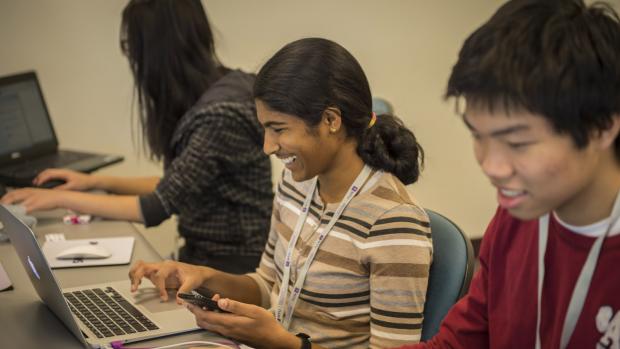Cyber Security Awareness Week Goes Local
Triumphant Maryland High School Team Brings the Fun of CSAW Home

Last week, at Montgomery College in Maryland, 40 young hackers sat rapt at their computers and smartphones, digging their way through a cyber mystery. Despite their proximity to the nation’s capital, their work wasn’t a matter of national security—rather, this cadre was the first group of students to participate in a local spinoff of the NYU Polytechnic School of Engineering’s acclaimed Cyber Security Awareness Week (CSAW) games.
CSAW is the largest student cyber security event in the world, with more than 18,000 students ranging from high school to graduate level participating in the preliminaries. A major event of the games is the High School Forensics Challenge—an entry-level competition that draws increasing numbers of young hackers to the “sport” every year, and serves as a powerful—and incredibly fun— introduction to the important field of computer security.
CSAW is the only major student cybersecurity competition to feature a high school event. Each year, students at NYU’s Information Systems and Internet Security Lab (ISIS) design a murder-mystery challenge for the dozens of teams who compete in the online qualifying rounds of the High School Forensics Challenge. Using beginner-level knowledge of rootkit detection, file carving, botnet detection and live system forensics, the students vie for just 12 team spots at the CSAW finals in Brooklyn.
After emerging triumphant from the 2014 games, the champion high school team from Poolesville High School in Maryland was determined to bring the thrill of CSAW home to their classmates. Led by Poolesville High computer science teacher Mark Estep, they spearheaded the effort to mount the first regional spinoff of the CSAW High School Forensics Challenge, teaming with nearby Montgomery College to bring the event to life.
On January 16, the first CSAW High School Forensics Regional Event took place, with more than 40 local high school students—including many from Poolesville who didn’t qualify for the Brooklyn finals—working to solve the same crime that vexed their classmates.
“We came up with the idea of a regional competition because there’s nothing like a live, face-to-face match to energize students and compel them to achieve,” said Estep. “The team who made it to New York had an extraordinary experience, but we wanted to bring some of that same spirit—and the same learning—back to other students in our area who didn’t qualify for CSAW.”
Estep brought his first team to CSAW in 2009 and has since built a robust computer security program at Poolesville High School. He believes that having a goal—namely, to qualify for CSAW and other cybersecurity competitions— is a tremendous motivator for his students to master the difficult science and math skills needed to qualify, and ultimately, to win.
NYU School of Engineering graduate student Meghan Caiazzo attended the regional event as a judge, and reported that the students’ enthusiasm—and their skills—were impressive. “Some performed at levels close to what we would expect at the CSAW finals,” she said.
And while just three students walked away with actual prizes—a pair of stylish, high performance headphones—they all walked away winners. “Schools were closed that day,” Estep explained. “These kids were here because they really wanted to be.”




